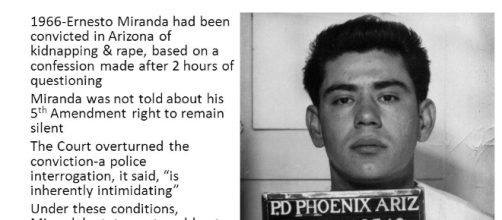So often we take for granted those that have influenced societal change. New generations forget the privileges and processes that were hard fought. The police interrogation process has many layers. In 1966 boundaries were implemented onto those layers with miranda v. Arizona.
Miranda
Ernesto Miranda was arrested and charged with rape, kidnapping, and robbery. He confessed to the crimes during a two-hour interrogation without legal counsel present. He was convicted and sentenced to 20 to 30 years in prison. Upon appeal the Courts determined that “statements obtained from an individual who is subjected to custodial police interrogation” are admissible against him in a criminal trial and whether “procedures which assure that the individual is accorded his privilege under the Fifth Amendment to the Constitution not to be compelled to incriminate himself” are necessary.
The Supreme Court ruled that “detained criminal suspects, prior to police questioning, must be informed of their constitutional right to an attorney and against self-incrimination.”
Law enforcement
In this procedure, Law enforcement had a duty to warn and failed to inform Miranda of his right to an attorney and against self-incrimination. The Fifth and Sixth Amendment of the United States Constitution provides a suspect the right to refuse to be a witness against himself and guarantees defendants a right to an attorney. The conviction was overturned and upon retrial, Miranda was again convicted and sentenced to 20 to30 years in prison.
Change in society
The fabric of society was fundamentally changed in the Miranda ruling.
This significant boundary is an instrument with which American culture endeavors to equalize practices and minimize potential government abuse. This envelops a defendant in a manner that blocks intimidation methods designed to force unchecked or false confessions. According to Chief Justice Warren, "the defendant under otherwise compelling circumstances to tell his story without fear, effectively, and in a way that eliminates the evils in the interrogations process."
Legacy
A legacy now bears his name. Moving forward law enforcement must Mirandize suspects prior to questioning. Law enforcement routine must include Miranda rights:
- The right to remain silent.
- Anything said can and will be used against [the defendant] in a court of law.
- Right to an attorney.
- The court can assign a defendant's attorney who can accompany him during interrogations.
These safeguards merge the rights of the state representing the people and the rights of the accused individual.
Each generation takes on the stewardship of society for the next generation. We are obligated to serve in the highest level of integrity that will generate the topmost outcomes.
In our current climate of fear that Police are acting in a racial manner, and as mainstream media play on the rights of minorities, it is important to know the roots of the Miranda.

